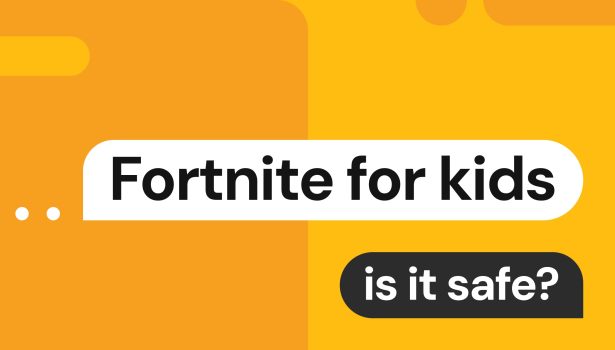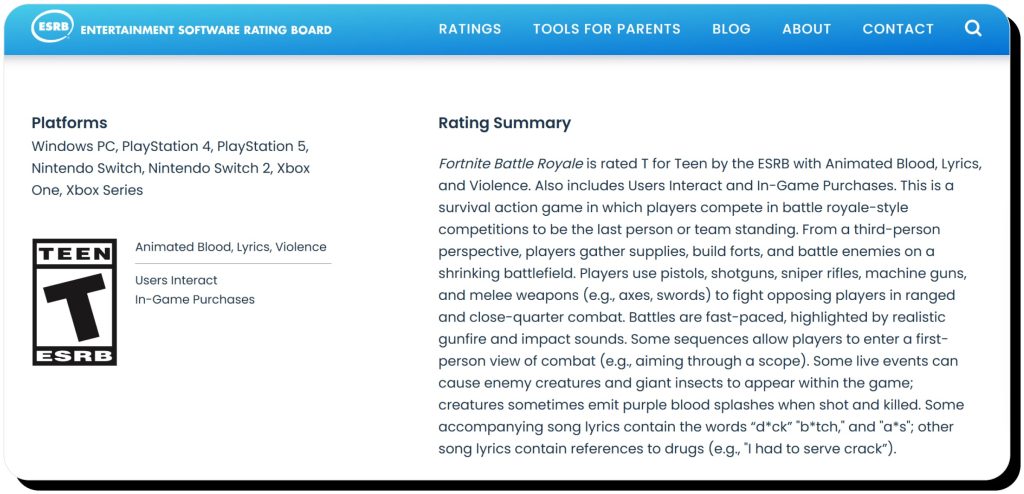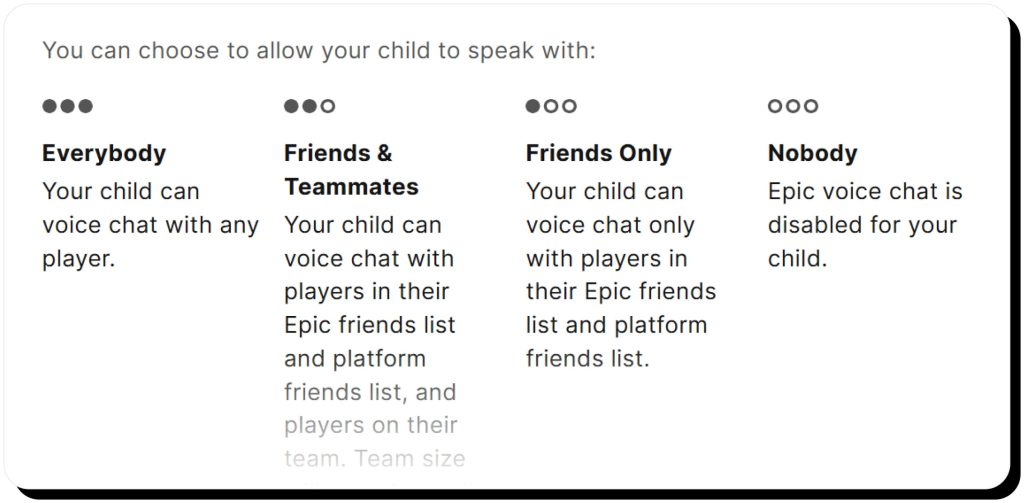Is Fortnite safe for kids? The ultimate parents’ guide to safety and controls

Fortnite has 7 different game modes—most of which, including Battle Royale, have a “T” (13+) rating due to cartoon-style violence, online interactions with other players, and the presence of real-money purchases. Users younger than 13 automatically get Cabined Accounts that have certain restrictions like limiting friend requests, requiring parental consent before unlocking full features, and blocking real purchases.
That said, whether the game is safe for your child depends on their maturity level and the safeguards you put in place. If parents stay involved and educate their kids on how to navigate online games, Fortnite can be a safe and enjoyable option.
What is Fortnite?
Fortnite is an online video game with multiple modes: some are sandbox (LEGO Fortnite), while the flagship (Battle Royale) is a last-player-standing shooter. You can play on the most popular video gaming platforms, including Nintendo Switch, Xbox, and PlayStation. The games are also available on both Apple and Android devices.
When parents wonder if Fortnite is safe for kids, they are usually referring to Fortnite Battle Royale (which is the most popular mode). Battle royale games typically put players up against a group of other players and/or characters scavenging for resources and battling until only one player or team remains. Fortnite allows up to 100 players to compete at a time, where they search for weapons, build forts and tunnels, and fight with the other users on the screen.
But Fortnite has become more than a video game—it’s now a well-known brand and a cultural phenomenon that hosts major live events with millions of players. Beyond showcasing updates to the game’s rules and design, the live events include concerts, movie screenings, and partnerships with Star Wars, Marvel, and LEGO.
This broader entertainment appeal draws in children and teenagers who want to be part of the action, eager to connect socially and feel included.
How old do you have to be to play Fortnite?
Epic Games, the developer of Fortnite, unlocks all features to those over 13 years old. Younger players automatically get restricted accounts with some features disabled until parents or guardians grant permission.
The Entertainment Software Rating Board (ESRB), a non-profit organization that has been the most trusted rating system for video games since 1994, assigns the following ratings to the 7 games under the Fortnite umbrella:
- T for Teen (13+): Most of the Fortnite game modes carry the T rating. These are not recommended for younger children due to some concerns about violence (even though it’s cartoonish in style), open communication with other users which may expose them to profanity, and the use of V-Bucks (in-game currency that requires real money to buy).
- E10+: Lego Fortnite is rated “Everyone 10 and older” as there’s no realistic combat. However, there is some mild cartoon violence and online interactions with other players.
- E for Everyone: Rocket Racing was released in 2023 and is the only Fortnite game mode that is suitable for players of any age. It is a classic arcade-style racing game without any combat.

Is Fortnite appropriate for kids?
Deciding whether or not Fortnite is ok for kids depends on their age, maturity level, and sensitivity to both violence and potential criticism from other players. It also depends on which game mode they are playing, as Battle Royale is more intense and combat-focused, while LEGO Fortnite and Rocket Racing are lighter, family-friendly experiences.
On one hand:
- There is no profanity in the actual game dialogue or text. Parents won’t have to worry about their kids hearing or reading curse words or conversations about inappropriate subjects in the game itself.
- Violence is cartoonish in nature and not nearly as realistic as in other popular games teens play, including Call of Duty or GTA.
- The gaming experience promotes strategy, teamwork, and creativity. Kids can develop critical thinking skills as they evaluate what combinations of weapons and movement tactics can help them win the game.
On the other hand:
- Players fight with guns and other weapons. Even though it’s cartoonish in nature, the constant combat and emphasis on eliminating opponents may still feel too intense or inappropriate for younger children.
- Kids may communicate with strangers via voice and text chats. This exposes them to bad language that isn’t filtered out by the game, cyberbullying, and even online predators.
- Unlocking some features costs money, and young kids may not realize that the money is real (not just some in-game currency). In fact, the FTC has recently taken action against Epic Games, awarding over $100M to families who were deceptively charged for the purchase of in-game upgrades.
- If not regulated properly, some children may develop an addiction. For example, kids with ADHD tend to get hyper-focused on things that interest them—which can as well be an online game.
- Some kids gamble on the games. Some third-party platforms take advantage of the competitive nature of Fortnite and exploit its users by allowing them to gamble on battles.
There is no one-size-fits-all answer to whether Fortnite is appropriate for kids. In general, it’s better to follow the Fortnite age restriction outlined by the ESRB. However, you can also take advantage of the parental controls provided by the platform to set certain restrictions while also allowing your children to enjoy the games.
Parental controls and privacy settings
By default, all users under the age of 13 get Cabined Accounts. These allow playing Fortnite but limit certain features and content, including:
- Talking to other users via text and voice chats
- Making purchases with real money
- Push notifications and marketing emails
When those under 13 register, they are required to provide a parent or guardian’s email address. The adult may tweak the controls and enable the features they believe are ok for the child to have.
The only downside of this process is that it’s not hard for players to enter the wrong birth date when signing up and there’s no robust verification to check the actual age.
Additional settings
Parents have various options when it comes to the privacy of their child’s account. Some of the aspects that can be managed are:
- Who your child speaks with. The options include “nobody”, “friends only”, “friends & teammates”, or “everybody” (though availability differs by age, with kids under 10 restricted to “friends only”)
- Mature language in text chats. When the filter is on, profanity will be replaced with heart symbols.
- Adding friends and making purchases with real money. These can be protected with a 6-digit PIN.
- The time your kid spends playing the game each day. You can also set specific time windows when a game can be played.

Additionally, parents can sign up for activity reports that provide info on how much time the child has played, their purchasing activity, and login history.
Tips for parents to make the Fortnite experience safer
Fortnite is a lot safer for children to use when parents apply the available restrictions and controls. However, it’s also important to teach youngsters how to play the game responsibly and discuss how to stay safe online in general.
Play Fortnite together
Playing Fortnite with your kids makes it much easier to keep an eye on what features they’re using, who they are playing with, and the dialogue happening during the game. Parents can make it a fun tradition, so it feels less like “spying” and more like a family activity.
Explain how to handle cyberbullying
Cyberbullying is common in the gaming community, and younger kids can be more vulnerable to taking it personally. Parents should educate their children about how to handle trolls and ignore rude, explicit, and degrading remarks. You should also show your kid how to block and report an offensive player.
Set screen time limits
Setting limits on how much time your children play Fortnite is the easiest way to make sure they don’t get carried away. You can find this feature in “Parental Controls” and either use a preset limit or customize your own.
Talk to your children about digital and online safety
Have conversations with your children about the importance of staying private online. Learning how to protect passwords, avoid interacting with strangers, and keep personal information hidden can help protect them from bullies and predators.
Regularly update the software for security
Fortnite regularly releases updated software, and it’s important to download it once it’s available. It won’t only improve the gaming experience, but it will also address any potential bugs.
Discuss in-game purchases
Talk about the difference between in-game currencies and real money so that your kid understands what they are spending. If you allow making legit purchases, it’s better to set limits to avoid overspending.
Stay up-to-date with Fortnite’s policies and restrictions
To make sure you take advantage of all the available features and know what content your child has access to, follow Fortnite’s updates.

Frequently Asked Questions
Why do parents say no to Fortnite?
The biggest concern parents typically have with Fortnite is that it’s focused on combat and eliminating other players. Even though violence is mild and cartoon-style, some consider it inappropriate for young users. Moreover, playing involves communicating with strangers, which may expose a child to cyberbullying, profanity, and online predators. Additionally, some parents claim their children are getting addicted to the game.
Can my child get addicted to Fortnite?
Theoretically, it’s possible that your child gets addicted to Fortnite due to its fast-paced matches, constant rewards, and the “just one more game” loop that encourages extended play. Moreover, people with ADHD tend to get hyper-fixated on things that are interesting to them, increasing the risks of addiction. However, if you set time limits and make sure your child engages in other activities during the day, Fortnite can be a good form of entertainment.
Can you make Fortnite kid-friendly?
You can make Fortnite kid-friendly by setting parental controls. These can limit communication with other players, filter out bad language, block purchases with real money, and block access to the game after a certain amount of time.
Is Fortnite educational in any way?
Some experts believe that playing Fortnite can provide benefits like developing critical thinking skills and teamwork. The game involves overcoming obstacles which requires creating strategies and adapting quickly to changing situations.





Mark comes from a strong background in the identity theft protection and consumer credit world, having spent 4 years at Experian, including working on FreeCreditReport and ProtectMyID. He is frequently featured on various media outlets, including MarketWatch, Yahoo News, WTVC, CBS News, and others.